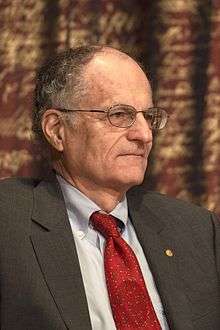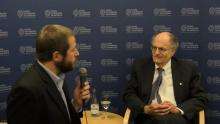Thomas J. Sargent
| Thomas J. Sargent | |
|---|---|
 | |
| Born |
July 19, 1943 Pasadena, California, U.S. |
| Nationality | American |
| Institution |
Hoover Institution University of Minnesota University of Chicago Stanford University New York University Singapore Management University |
| Field | Macroeconomics, monetary economics |
| Alma mater |
UC Berkeley, (BA) Harvard University, (PhD) |
| Doctoral advisor | John R. Meyer |
| Doctoral students |
Robert Litterman Martin Eichenbaum Felipe Montt Wayne Carroll Inbong Ha Paul O'Brien Andrew Atkeson Selu Imrohoroglu Ellen McGrattan Marco Bassetto Riccardo Colacito Sagiri Kitao Jun Nie Rüşdü Saracoğlu |
| Influences |
Robert Lucas, Jr. John Muth |
| Awards |
NAS Award for Scientific Reviewing (2011) Nobel Memorial Prize in Economic Sciences (2011) |
| Information at IDEAS / RePEc | |
Thomas John "Tom" Sargent (born July 19, 1943) is an American economist, who is currently the W.R. Berkley Professor of Economics and Business at New York University.[1] He specializes in the fields of macroeconomics, monetary economics and time series econometrics. As of 2014, he ranks fourteenth among the most cited economists in the world.[2] He was awarded the Nobel Prize in Economics in 2011 together with Christopher A. Sims "for their empirical research on cause and effect in the macroeconomy".[3]
Education
Sargent graduated from Monrovia High School.[4] He earned his B.A. from the University of California, Berkeley in 1964, being the University Medalist as Most Distinguished Scholar in Class of 1964, and his PhD from Harvard in 1968, under supervision of John R. Meyer.[5] Sargent's classmates at Harvard included Christopher A. Sims. He held teaching positions at the University of Pennsylvania (1970–71), University of Minnesota (1971–87), University of Chicago (1991–98), Stanford University (1998–2002) and Princeton University (2009), and is currently a Professor of Economics at New York University (since 2002). He is a Fellow of the Econometric Society since 1976. In 1983, Sargent was elected to the National Academy of Sciences and also the American Academy of Arts and Sciences.[6] He has been a senior fellow of the Hoover Institution at Stanford University since 1987, a member of the Advisory Board of the Penn Institute for Economic Research at the University of Pennsylvania and distinguished term professor of the School of Economics at Singapore Management University since 2015.[7]
Professional contributions
Sargent is one of the leaders of the "rational expectations revolution," which argues that the people being modeled by economists can predict the future, or the probability of future outcomes, at least as well as the economist can with his model. Rational expectations was introduced into economics by John Muth,[8] then Robert Lucas, Jr., and Edward C. Prescott took it much farther. By some works written in close collaboration with Lucas and Neil Wallace, Thomas J. Sargent could fundamentally contribute to the evolution of new classical macroeconomics.[9]
Sargent's main contributions to rational expectations were these:
- trace the implications of rational expectations, with Wallace, for alternative monetary-policy instruments and rules on output stability and price determinacy.[10]
- help make the theory of rational expectations statistically operational.[11]
- provide some early examples of rational expectations models of the Phillips curve, the term structure of interest rates, and the demand for money during hyperinflations.[12][13][14][15]
- analyze, along with Wallace, the dimensions along which monetary and fiscal policy must be coordinated intertemporally.[16]
- conduct several historical studies that put rational expectations reasoning to work to explain consequences of dramatic changes in macroeconomic policy regimes.[17][18][19][20]
In 1975 he and Wallace proposed the policy-ineffectiveness proposition, which refuted a basic assumption of Keynesian economics.
Sargent went on to refine or extend rational expectations reasoning by doing this:
- studying the conditions under which systems with bounded rationality of agents and adaptive learners converge to rational expectations.[21][22][23]
- using the notion of a self-confirming equilibrium, a weaker notion of rational expectations suggested by limits of learning models.[23]
- studying contexts with Lars Peter Hansen in which decision makers do not trust their probability model. In particular, Hansen and Sargent adapt and extend methods from robust control theory.[24]
Sargent has also been a pioneer in introducing recursive economics to academic study, especially for macroeconomic issues such as unemployment, fiscal and monetary policy, and growth. His series of textbooks, co-authored with Lars Ljungqvist, are seminal in the contemporary graduate economics curriculum.
Sargent has pursued a research program with Ljungqvist[25] designed to understand determinants of differences in unemployment outcomes in Europe and the United States during the last 30 years. The two key questions the program addresses are why, in the 1950s and 1960s, unemployment was systematically lower in Europe than in the United States and why, for two and a half decades after 1980, unemployment has been systematically higher in Europe than in the United States. In "Two Questions about European Unemployment," the answer is that "Europe has stronger employment protection despite also having had more generous government supplied unemployment compensation"." While the institutional differences remained the same over this time period, the microeconomic environment for workers changed, with a higher risk of human capital depreciation in the 1980s.[26]
In 2011, he was awarded the NAS Award for Scientific Reviewing from the National Academy of Sciences[27] and, in September, he became the recipient of the 2011 CME Group-MSRI Prize in Innovative Quantitative Applications.[28]
Sargent is known as a devoted teacher. Among his PhD advisees are men and women at the forefront of macroeconomic research . Sargent's reading group at Stanford and NYU is a famous institution among graduate students in economics.[29][30]
Nobel Prize

On October 10, 2011, Sargent, with Christopher A. Sims, was awarded the Nobel Memorial Prize in Economic Sciences. The award cited their "empirical research on cause and effect in the macroeconomy".[31] His Nobel lecture, "United States Then, Europe Now," was delivered on December 11, 2011.[32]
In popular culture
He is featured playing himself in a television commercial for Ally Bank in which he is asked if he can predict CD rates two years from now to which; he simply answers, "No." [33]
Sargent is notable for making short speeches. For example, in 2007 his Berkeley graduation speech consumed 335 words.[34][35]
Selected publications
- Sargent, Thomas J. (1971). "A Note on the Accelerationist Controversy". Journal of Money, Credit and Banking. Blackwell Publishing. 3 (3): 721–25. doi:10.2307/1991369. JSTOR 1991369.
- Sargent, Thomas J. & Neil Wallace (1973). "The Stability of Models of Money and Growth with Perfect Foresight". Econometrica. The Econometric Society. 41 (6): 1043–48. doi:10.2307/1914034. JSTOR 1914034.
- Sargent, Thomas & Wallace, Neil (1975). "'Rational' Expectations, the Optimal Monetary Instrument, and the Optimal Money Supply Rule". Journal of Political Economy. 83 (2): 241–54. doi:10.1086/260321.
- Sargent, Thomas & Wallace, Neil (1976). "Rational Expectations and the Theory of Economic Policy". Journal of Monetary Economics. 2 (2): 169–83. doi:10.1016/0304-3932(76)90032-5.
- Sargent, Thomas J. (1987) [1979]. Macroeconomic Theory. New York: Academic Press. ISBN 0-12-619750-4.
- Sargent, Thomas J. and Lars P. Hansen (1980). "Formulating and Estimating Dynamic Linear Rational Expectations Models". Journal of Economic Dynamics and Control. 2 (1): 7–46. doi:10.1016/0165-1889(80)90049-4.
- Sargent, Thomas J. & Neil Wallace (1981). "Some Unpleasant Monetarist Arithmetic". Federal Reserve Bank of Minneapolis Quarterly Review. 5 (3): 1–17.
- Sargent, Thomas J. (1983). “The Ends of Four Big Inflations” in: Inflation: Causes and Effects, ed. by Robert E. Hall, University of Chicago Press, for the NBER, 1983, pp. 41–97.
- Sargent, Thomas J. (1987). Dynamic Macroeconomic Theory. Harvard University Press. ISBN 0-674-21877-9.
- Sargent, Thomas J. and Albert Marcet (1989). "Convergence of Least Squares Learning Mechanisms in Self-Referential Linear Stochastic Models". Journal of Economic Theory. 48 (2): 337–68. doi:10.1016/0022-0531(89)90032-X.
- Sargent, Thomas J. & Albert Marcet (1989). "Convergence of Least Squares Learning in Environments with Hidden State Variables and Private Information". Journal of Political Economy. 97 (6): 251. doi:10.1086/261603.
- Sargent, Thomas J. & Lars Ljungqvist (2000, 2004). Recursive Macroeconomic Theory. MIT Press. ISBN 0-262-12274-X. Check date values in:
|date=(help) - Sargent, Thomas J. & Lars Hansen (2001). "Robust Control and Model Uncertainty". American Economic Review. 91 (2): 60–66. doi:10.1257/aer.91.2.60.
References
- ↑ "Thomas Sargent". http://www.stern.nyu.edu/. NYU Stern. Retrieved 3 July 2016. External link in
|website=(help) - ↑ "Economist Rankings at IDEAS". Ideas.repec.org. Retrieved 2011-10-10.
- ↑ Nobel Prize Press Release
- ↑ http://www.pasadenastarnews.com/general-news/20111010/monrovia-high-grad-wins-nobel-prize-in-economics
- ↑ Sent, Esther-Mirjam (2006). The Evolving Rationality of Rational Expectations: An Assessment of Thomas Sargent's Achievements. Cambridge University Press. p. 35.
- ↑ "Book of Members, 1780–2011: Chapter S" (PDF). American Academy of Arts and Sciences. Retrieved 13 October 2011.
- ↑ http://www.smu.edu.sg/news/2014/05/28/smu-appoints-nobel-laureate-thomas-j-sargent-its-distinguished-term-professor
- ↑ Muth, J. F. (1961). "Rational Expectations and the Theory of Price Movements". Econometrica. 29 (3): 315–35. doi:10.2307/1909635. JSTOR 1909635.
- ↑ Galbács, Peter (2015). The Theory of New Classical Macroeconomics. A Positive Critique. Heidelberg/New York/Dordrecht/London: Springer. ISBN 978-3-319-17578-2.
- ↑ Sargent, Thomas J., and Neil Wallace, 1975. "'Rational' Expectations, the Optimal Monetary Instrument, and the Optimal Money Supply Rule," Journal of Political Economy, 83(2), pp. pp. 241–54.
- ↑ Sargent, T. J. (1981). "Interpreting Economic Time Series". The Journal of Political Economy. 89 (2): 213–48. doi:10.1086/260963. JSTOR 1833309.
- ↑ Sargent, Thomas J.; Wallace, Neil (1976). "Rational Expectations and the Theory of Economic Policy" (PDF). Journal of Monetary Economics. 2 (2): 169–83. doi:10.1016/0304-3932(76)90032-5.
- ↑ Sargent, T. J. (1979). "A note on maximum likelihood estimation of the rational expectations model of the term structure". Journal of Monetary Economics. 5: 133–35. doi:10.1016/0304-3932(79)90029-1.
- ↑ Sargent, T. J. (1977). "The Demand for Money during Hyperinflations under Rational Expectations: I". International Economic Review. 18 (1): 59–82. doi:10.2307/2525769.
- ↑ Sargent, T. J.; Fand, D.; Goldfeld, S. (1973). "Rational Expectations, the Real Rate of Interest, and the Natural Rate of Unemployment". Brookings Papers on Economic Activity. 1973 (2): 429–80. doi:10.2307/2534097.
- ↑ Sargent, Thomas J. & Neil Wallace (1981). "Some Unpleasant Monetarist Arithmetic". Federal Reserve Bank of Minneapolis Quarterly Review. 5 (3): 1–17.
- ↑ Sargent, Thomas J. (1983). “The Ends of Four Big Inflations” in: Inflation: Causes and Effects, ed. by Robert E. Hall, University of Chicago Press, for the NBER, 1983, p. 41–97.
- ↑ Sargent, T. J.; Velde, F. O. R. (1995). "Macroeconomic Features of the French Revolution". The Journal of Political Economy. 103 (3): 474–518. doi:10.1086/261992.
- ↑ Sargent, Thomas J. (1992). Rational Expectations and Inflation. Harper and Row. ISBN 0-06-500280-6.
- ↑ Sargent, Thomas J.; Velde, F.R. (2003). The Big Problem of Small Change. Princeton University Press. ISBN 978-0-691-11635-8.
- ↑ Sargent, Thomas J. (1993). Bounded Rationality in Macroeconomics. Oxford University Press. ISBN 978-0-19-828869-5. Description and chapter-preview 1st-page links.
- ↑ Marcet, A. (1989). "Convergence of least squares learning mechanisms in self-referential linear stochastic models*1". Journal of Economic Theory. 48 (2): 337–68. doi:10.1016/0022-0531(89)90032-X.
- 1 2 Sargent, Thomas J. (1999). The Conquest of American Inflation. Princeton University Press. ISBN 0-691-00414-5.
- ↑ Hansen, Lars Peter; Sargent, Thomas J. (2008). Robustness. Princeton University Press. ISBN 0-691-11442-0.
- ↑ "Lars Ljungqvist".
- ↑ Ljungqvist, L.; Sargent, T. J. (2008). "Two Questions about European Unemployment". Econometrica. 76: 1. doi:10.1111/j.0012-9682.2008.00816.x.
- ↑ "NAS Award for Scientific Reviewing". National Academy of Sciences. Retrieved 27 February 2011.
- ↑ "2011 CME Group-MSRI Prize".
- ↑ "Conference in Honor of Tom Sargent's Nobel Prize in Economics and Reading Group Reunion".
- ↑ "Videos of Reading Group Conference".
- ↑ "The Prize in Economic Sciences 2011". Nobelprize.org. 2008-12-10. Retrieved 2011-10-10.
- ↑ • http://www.nobelprize.org/nobel_prizes/economics/laureates/2011/sargent-lecture.html
• Sargent, Thomas J. (2011). "United States Then, Europe Now," Nobel lecture. - ↑ AdWeek: Economist Thomas J. Sargent appears in ad for Ally Bank
- ↑ Tom Sargent Summarizes Economics
- ↑ Text of Berkeley Speech
External links
| Wikimedia Commons has media related to Thomas J. Sargent. |
| Wikiquote has quotations related to: Thomas J. Sargent |
- Homepage at the New York University website
- Sargent personal website
- Bloomberg News "Nobels Give Econometrics Pioneers Their Due"
